The Four Thousand, the Eight Hundred Read online
Page 7
“You’d hang us out to dry? You’d let them murder eight hundred people?”
“And you’d let them murder four thousand?”
Burton said, “You don’t know that they’re not bluffing about that.”
“And you don’t know that they’d refuse a boarding party,” Anna countered. No one had to die. They just had to organise a peaceful rendezvous.
“We’re coming in,” Burton replied. “What you do with the airlocks is on your conscience.”
The overlay cut out. Anna felt herself sag as if she’d been struck. This decision was beyond her—but who could she defer to? This was her job, no one else’s.
She closed her eyes. That Olivier had made her feel as if she knew these people didn’t help. How could she stand back and let the Vestans crush Camille between boulders? But how could she conspire with them to keep Gustave locked out of Ceres until they blew the Arcas apart?
The numbers were clear. Unless Vieira was bluffing. But the threat to the Arcas wasn’t certain either. If all things were equal, she had to protect the riders. Unless Vieira planned to cheat her: to hold back the data about the flips. But why would he do that? Why would Vesta needlessly court opprobrium from across the inhabited worlds?
But wouldn’t the same fear of sanctions keep them from butchering the riders, regardless—even if the Arcas was given shelter? Surely the whole thing had to be a bluff?
She didn’t know that. She couldn’t know that.
“Call the Arcas,” she told her Assistant. The scheduled docking was less than ninety minutes away.
Burton appeared, stony faced.
“Can we fake this?” she asked. “Make it look as if you’ve been denied entry—but get everyone out in spacesuits? The Arcas goes into a holding orbit, the Scylla flies by and…does what it does…but no one is on board. We’ll bring you all in, in secret, and hide you for as long as it takes to be sure that the riders are safe.”
Burton hesitated. Anna struggled to decipher his expression. He did not seem affronted by the plan, by the dangers the evacuation would pose, but he was weighing up something.
“All right,” he said. “We can do this.”
Anna told her Assistant to inform the Scylla that the Arcas would not be docking, then she had it coordinate the evacuation with the ferry’s navigator.
No one could leave the Arcas until the engines shut off and it was orbiting Ceres, but they could all be suited and ready, their gas jets programmed to take them down to airlocks. The passengers themselves would need no skill or experience, so long as Burton and his crew could keep them calm and stop them doing anything foolish. It would take a while to cycle eight hundred people through the ten suitable airlocks—but that was just a question of patience. Their suits could keep them alive on the surface for a hundred times longer than they’d need.
Anna stared at the projections in front of her, at the orderly succession of eight hundred hair-thin trajectories splitting from the Arcas’s circle like a strange spider’s web. She’d come so close to turning these people away. But it was her job to go and face them now, to greet them as they entered, however much shame and confusion was still clamouring in her head.
She made her way down the corridors slowly; there was no hurry, no need to glide. She thought about the joy she’d seen on Olivier’s face at the prospect of meeting Gustave again. Chloe had accused her of seeking a new family, but was there anything so terrible about that? She couldn’t understand what Olivier had been through, but she could still stand beside him and be glad that he was safe, that his comrades were safe, and that in time even Camille would be with him. She would never stop loving Sasha, but—
“The evacuation has started,” her Assistant informed her. Anna paused and stood in the corridor, watching an overlay from the port’s radar. Reality was recapitulating the projection, unfurling the same beautiful web.
“Incoming call from the Scylla.”
Anna was surprised; she hadn’t been expecting a reply until the Arcas was in a million pieces.
“I’ll take it,” she said.
Vieira appeared. Anna couldn’t read his face, but he did not look triumphant at his victory.
“So you’ve made your choice,” he said. “Over.”
“Yes. The Arcas is in orbit. There’ll be no docking. Over.”
“We can see everything,” he said flatly. “You’re taking the people out. You’re sheltering the criminals. Over.”
“That’s not true!” Anna protested. “Over.”
“What were you thinking?” he chided her. “We’re not so far away that we can’t image a spacesuit. The count so far is…thirty seven. Over.”
Anna’s overlay put the number at thirty nine—but he had to be watching, not guessing. Burton must have known that this would happen. Maybe he’d considered—for a second or two—the logistics of trying to perform the evacuation in such a way that every passenger remained hidden from the Scylla behind Ceres, but quickly realised that that would be impossible.
Vieira broke the silence. “You did not comply with our request,” he declared. “So I regret that we can not comply with yours. Scylla to Ceres, over and out.”
15
Anna watched the feed from the surveyor robot as the pale speck of the cargo block emerged from the background of stars. The remnants of the life support pod had been spotted from fifty thousand kilometres, leaving no doubt as to the fate of the occupant, but the identification itself could not be completed from afar.
Thin shards of white plastic and darker composites embedded in the sheath were spread out in the familiar burst pattern of fractured elliptical rings. The robot homed in on a point a metre or so from the centre, relying on the fleet’s cumulative experience of the most likely place to find tissue samples. Anna spotted a small patch of shiny grey flakes just as the image processing software flagged it for investigation. Given the time lag it was rare for her to be able to contribute to the search, but it was worth having someone looking over the robots’ shoulders to help them out on those rare occasions when their own strategies failed.
The flakes proved to be exactly what she’d guessed, and the preparation and sequencing was complete in half an hour. There was a single, unambiguous match in the kinship marker database: Thierry Rocault, twenty-nine. Backing up the DNA evidence, Rocault’s date of departure from Vesta was consistent with the current location of the block.
Anna passed the record on to the team’s chief forensic pathologist, to be verified before the notification went out to the family. Then she shut off the overlay and swayed for a moment, fighting down panic.
When the doorbell rang she glanced at the time; more than two hours had passed, but she had no idea what she’d been doing. She looked through the security camera.
Olivier said, “I’m going to stand here until you let me in.”
The last time Anna had called his bluff he’d stayed there for hours. She opened the door and stood aside.
Olivier walked over to the couch and sat down. “I’d like you to come to the wake.”
“No.”
“It’s up to you. But I want you to be there.”
“I can’t. It would be an insult to all of her friends.”
“None of them see it that way,” he replied. “Trust me, if it was going to be like that I wouldn’t put you through it.”
Anna shook her head. “I can’t.”
Olivier said, “I’ve persuaded three more people to drop their actions. That still leaves seven, but I’m going to keep trying. They’re just lashing out because they can’t get the Vestans in front of a court yet, but everyone who’s actually been willing to talk to me ends up admitting that a judgement against you would bring them no satisfaction.”
“They have their rights,” Anna replied. “You shouldn’t try to stop them.”
“Their rights?” Olivier grimaced. “The only thing they’d achieve if they won their case would be to make Ceres more vulnerable to extortion in the future
.”
Anna said, “We have a special name, here, for a certain kind of failure to defer to the greater good—for putting a personal sense of doing right above any objective measure of the outcome. It’s called ‘moral vanity’. On Ceres, it’s about the worst thing you can be accused of. So I’d say that those plaintiffs stand a very good chance of success.”
“And you really want to be made an example of? You want other people to be afraid to do what you did?”
Anna couldn’t answer that. “What did I do? I talked myself into believing that the evacuation would go unnoticed, that I could save the Arcas and nothing would come of it.”
“You took a risk,” Olivier said firmly. “But you took the right one.”
“Thousands more people died than if I hadn’t. I’ve seen what’s left of them spread across the cargo sheaths.”
Olivier rose to his feet and walked over to her. “Listen to me. There’s a place for algorithms that weigh up the numbers and decide everything on that basis—but if the hypocrites who accuse you of ‘moral vanity’ really wanted everything run that way, they should have just put their anointed algorithm in charge, and declared all their problems solved forever. If you’d turned the Arcas away, you wouldn’t have done a greater good—you would have crushed out of existence, for yourself and everyone on Ceres, the thing that gives those numbers meaning.”
Anna started sobbing. Olivier reached out and held her shoulders. “I don’t know what I should have done,” she said. “I don’t know.”
Olivier waited until she was still. “Come and say goodbye to Camille,” he pleaded. “You can’t sit here alone, counting bodies. Come and hear about her life.”

 Zendegi
Zendegi Permutation City
Permutation City The Eternal Flame
The Eternal Flame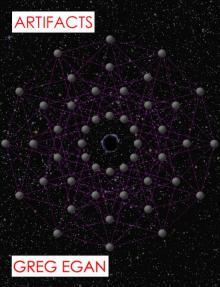 Artifacts
Artifacts Wang's Carpets
Wang's Carpets Dichronauts
Dichronauts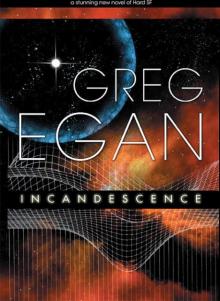 Incandescence
Incandescence Teranesia
Teranesia Schild's Ladder
Schild's Ladder Quarantine
Quarantine The Four Thousand, the Eight Hundred
The Four Thousand, the Eight Hundred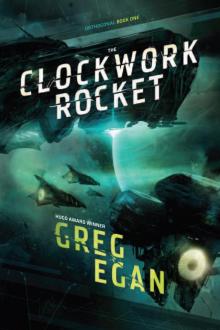 The Clockwork Rocket
The Clockwork Rocket Zeitgeber
Zeitgeber Phoresis
Phoresis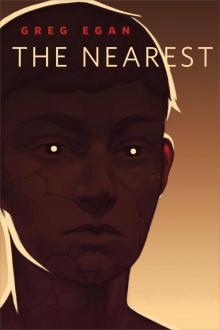 The Nearest
The Nearest Diaspora
Diaspora Instantiation
Instantiation Distress
Distress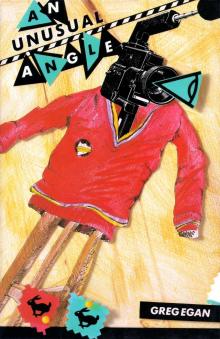 An Unusual Angle
An Unusual Angle Oceanic
Oceanic The Arrows of Time
The Arrows of Time Axiomatic
Axiomatic![Anthology 2. Luminous [1998, 2010] Read online](http://i1.bookreadfree.com/i/03/18/anthology_2_luminous_1998_2010_preview.jpg) Anthology 2. Luminous [1998, 2010]
Anthology 2. Luminous [1998, 2010] Perihelion Summer
Perihelion Summer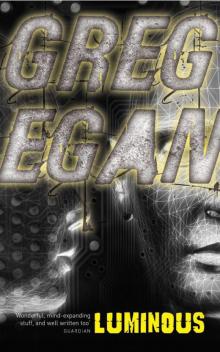 Luminous
Luminous